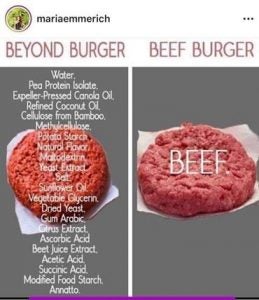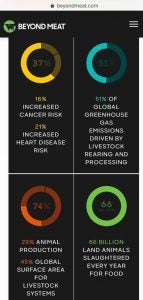There are a lot of similarities between the anti-GMO and anti-meat movements.
Both campaign ideologies are heavily funded by food corporations and activist groups that too often aren’t motivated by science and data in spreading their “information” to the public.
While the anti-GMO movement is backed by organic food corporations and the highly profitable non-GMO label, anti-meat also has earned praise from the same groups for using the label in their marketing. The very passionate and extremist anti-meat “Go Vegan” activist groups profit off of their ideology — think: “Livestock are destroying the planet! Go vegan! Donate now!”
Are livestock actually destroying the planet? Likely not, based on the available independent data, but more on that later.
Then there is this Twitter thread, which is TOTALLY worth the read. It involves Goldman Sachs, investors, Kleiner Parkins, the founders and partners within Beyond Meat, among many others. A few highlights:
- I’m a decent fan of the Impossible line, but let’s not pretend we know what long term effects will be on human consumption. It’s essentially a dog food recipe with flavor and color added. Doesn’t mean it’s bad, but idk about clean lol
- Of course investors are going to hop on the plant-based band wagon. That doesn’t discredit the vegan movement, it just shows all investors care about is money. We knew that?
- Beef consumption is down over 30% since sat Fat was demonized 40+ years ago. Fewer cows now than back then yet CO2 is building in atmosphere. It’s not the cows and they know it. All studies pointing to animals have been debunked.
It’s an interesting discussion of who funds what, why is there such a big push to cut back on meat, and where is this information coming from? I’m not much of a conspiracy theorist but … just read it.
1) So I was curious why there was this sudden push to cut meat, particularly beef consumption, it seemed to come out of nowhere, so I did a little research, a thread: https://t.co/8baJfISZ7c
— S____ (@_S70DD) August 4, 2019
The Cliffs Notes’ version: Anti meat? Follow the money.
Every so often an image is shared on social media that puts down the “fake meat” alternatives, and people don’t always understand the hate toward it. Here is a good example:

Some may argue this image is fearmongering or not based in science. Who cares if these perfectly safe additives are part of an alternative burger? Others may argue it’s the processed “pink slime” narrative all over again or focus on the fact it stirs an emotion in us. Others just have a “Leave Brittney Alone” mentality and don’t want to stir up the “us vs them” mentality in the food world.
I agree with that sentiment. Veggie burgers and regular burgers have coexisted for decades just fine with no issues, so what’s changed?
The answer is simple: The reason people are pushing back against these alternative burgers is due to its aggressive and sometimes slanderous marketing. Here’s a quote from Pat Brown, the creator of the Impossible Foods plant-based burger, given during an interview on CBS:
“CBS: So do you think you’re going to be putting the conventional meat business out of business?
Brown: That’s the whole purpose of Impossible food.
CBS: You want them gone?
Brown: The purpose of Impossible foods is … this industry and this technology is the greatest threat to the future of our planet. Period.”
This is the “beef” with “no beef.” Even if some people “feel” that way, it is probably best to not announce that to the world and instead let the industry naturally run its course. By putting down the beef industry in this manner, they are alienating a large part of a potential customer base who would be willing to given their product a try (myself included.)
The argument that livestock are destroying the planet have been readily debunked for years (read more here and here), but it doesn’t stop companies such as Impossible Foods from tapping into the public’s fears and stresses to sell products. We’ve seen it before in other sectors of agriculture, and, unfortunately, it’s almost certain that we’ll see it again.
Not only that, but one plant-based patty maker, Beyond Meat, has also taken a strong anti-GMO stance and used that as a launching pad for some of its more concerning marketing tactics (even as the CEO claims a whole lot of ignorance about the technology). However, deceiving consumers can only work for so long.
While companies such as Beyond Meat aren’t making their case through facts, they are doubling down on their messaging. Here are some of their more dubious claims that they’ve made about real meat:

Fifty-one percent? Say what now? That number comes from the Washington, D.C.-based World Resources Institute, who’s co-chair is tied to the biggest investor in Beyond Meat. (See this Twitter thread link again.) The real number globally is 14.5 percent, where the number for cattle in the U.S. is right around 3 percent (only a fraction of agriculture’s already-small American footprint). According to the Food and Agriculture Organization of the United Nations, 60 percent of agricultural land globally is range land that can only be utilized as grazing land for ruminant livestock. Considering these lands are not suitable for anything other than raising livestock, animal agriculture can help combat climate change when managed correctly. There are many other issues to take up with Beyond Meat marketing, but these are just a couple examples.
Fearmongering, over-exaggeration, and misinformation for profit? Now you understand why so many people take issue with these companies.
Sometimes when I defend the meat industry personally, people claim it’s a meat bias … like I’m only saying that because we are beef producers and feel a bit threatened. There may be a little truth to that, but keep in mind we are also soybean producers. A majority of farmers who defend their livestock operations are diversified, so from a business and profitability perspective, we can sell just as much soy to the fake-meat companies as we could beef. And let’s also take into account the fact that both the beef and soy market prices are horrific and not profitable right now in either sector.
It’s really got nothing to do with business or money — it’s got to do with the fact we would like our businesses and hard work to be respected and accurately portrayed. Farmers tend to be very hard working, honest, salt-of-the-earth people. And they feel under appreciated; meanwhile the privileged “First World” war on food creates division even as the bellies of those warmongers are totally full. Farmers just want a fair shake, both of the hand and for fair trade.
All business aside, what if we could eat beef without ever having to butcher another beef animal? I don’t think anyone in their right mind could really complain about that from an ethical standpoint, assuming the quality, flavor, environmental footprint, and healthfulness were the same or better. (Which, admittedly, is probably near “impossible,” pun intended.)
There are plenty of arguments that cattle actually do an excellent job of sequestering carbon and contribute a great deal to the environment in a positive way. This link from former environmental attorney Nicolette Hahn Niman, author of “Defending Beef,” explains. She’s quite knowledgeable on the topic, as are Dr. Frank Mitloehner, Dr. Alison Van Eenennamm, Dr. Judith Capper, and Dr. Sarah Place to name a few.
These professionals, with decades of experience and who do the research and study this topic for a living, are worth following and learning from. Look them up and read their expert research, it will certainly broaden and educate everyone’s perspective on the topic.
Michelle Miller, the Farm Babe, is an Iowa-based farmer, public speaker, and writer, who lives and works with her boyfriend on their farm, which consists of row crops, beef cattle, and sheep. She believes education is key in bridging the gap between farmers and consumers.



